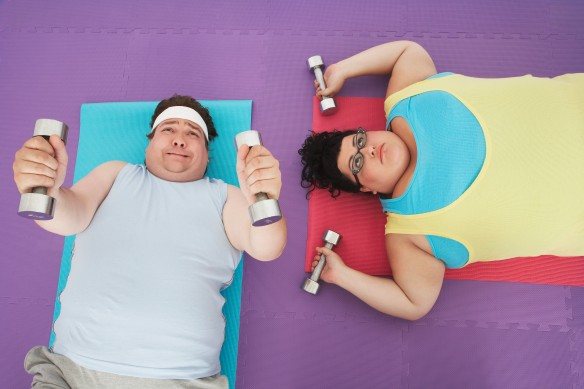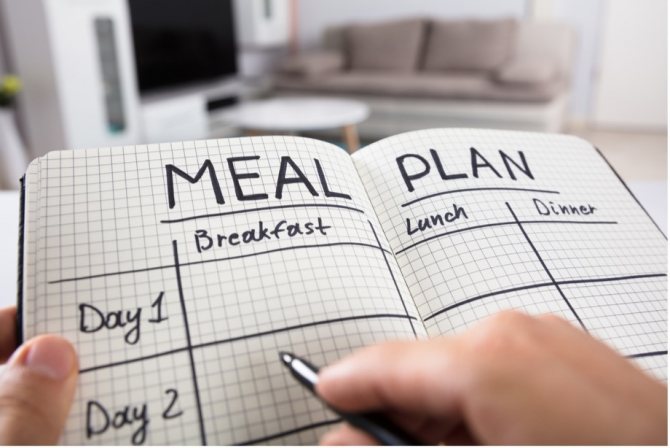It’s easy to accumulate, but much more difficult to get rid of.
To lose weight, we need to spend more calories than we get from food. It's simple. Everybody knows. But if you look at the sad statistics on the growth of obesity (and even just at people on the street), it becomes obvious that difficulties arise with implementation in practice. Alas, our bodies are designed in such a way that they can easily and naturally increase fat mass at the “unlimited” rate, but when it comes to getting rid of these reserves, problems begin. Our body and our brain do not like to lose weight. And accordingly, they hinder this process in every possible way.
Yes, at first everything goes very smoothly. Let’s say you set yourself a daily limit of 1,700 calories and confidently stick to this plan for a day, two, three, sometimes five or six. But then... And then a breakdown occurs. If you are not a competitive athlete in the fitness category and, in addition, are not very experienced in losing weight, then the question is not “what to do IF this happened?”, but “what to do WHEN this happened?”.
Photo: istockphoto.com
Why do I want to eat so much?
To begin with, here are literally a few examples of how these breakdowns can be provoked. Let's say you lack motivation. This happens all the time, when a person is generally satisfied with his appearance, but he is tormented by his significant other: “We urgently need to lose weight, let’s go on a diet.” Such weight loss for company will end very quickly, as soon as it begins.
Often, an unauthorized trip to the food court of the nearest shopping center is provoked by the lack of visible results. Now you’ve been eating right for a whole week, try not to miss meetings with a personal trainer at the fitness club, and the scales are not showing the proper dynamics. Thoughts naturally creep into my head: “Since I can’t lose weight, it means it’s simply not given to me. So why should I torture myself?!”
When faced with such stories, I like to quote Mike Tyson
: “When things get tough, I always remind myself that if I give up, things won’t get better.” It’s the same with us. Remember why and why you started this whole story. Is this goal still important and meaningful to you? And if so, then you simply have no choice - you need to go to the result. Yes, sometimes weight or waist, or even both indicators may not change for a week or even two. And this does not mean that something is going wrong. Everything is fine, it’s just that the body is also resisting. Metabolic adaptation also occurs. But if you act according to a clear and competent plan, then your chances of winning are 100%. Fat deposits can win local battles (not decrease for a whole week), but they cannot win this war against you. Everything will definitely work out.

Photo: istockphoto.com
Eating breakdowns: what leads to uncontrollable gluttony
A food breakdown is a litmus test that indicates that you are going the wrong way with your diet or exercise routine. Fitness trainer and blogger Artem Brazgovsky told Dni.ru why we sell our souls for eclairs and how to fight this food crime.
Having swallowed a whole elephant and come to your senses, you proceed to “dessert” - eating yourself for what you have done. You scold yourself and, with all your might, begin to “work off” what you ate uncontrollably. But! Very soon you will have a new breakdown, perhaps even more serious. After all, “working out” in the gym or an intense diet only aggravates the problem. You are trying to correct the consequence, but you need to look for the cause of this behavior.
Why do breakdowns happen?
There are several reasons for eating disorders and they are often interrelated. Typically, here we are dealing with three main factors:
- too few calories
- too much training
- lack of full recovery and lack of sleep
A calorie deficit during a diet gives clear hormonal changes, leads to an increase in uncontrolled appetite, and in women it can be accompanied by amenorrhea (absence of menstruation for 6 months or more).
The risk of breakdowns and amenorrhea increases when you reduce fat and calories in your diet and try to use low-calorie and low-fat foods everywhere. Remember: you should not reduce the amount of fat in your diet below 1 gram per 1 kg of weight if you do not want problems with the reproductive cycle. In addition, classic “proper nutrition” operates with a meager diet of foods: to create a calorie deficit, you remove flour, fatty foods, foods with a lot of simple carbohydrates or salt. As a result, you form a narrow food basket. And the stricter the approach to nutrition, the more painful any deviation from the rules is perceived. Hence the conclusion: even if you are losing weight, you should have a lot of varied foods in your diet.

Photo: www.globallookpress.com
Exercise moderately. The body's ability to operate in a calorie deficit is limited, and a high amount of training will only increase appetite and reduce recovery.
Don't ignore good and restful sleep! Decreased sleep quality leads to an increase in ghrelin (which leads to uncontrolled appetite) and a decrease in leptin (decreased satiety), as well as a decrease in your activity level. The less you move, the worse you lose weight. Lack of sleep increases activity in the brain's amygdala and leads to the desire to eat something high in calories. Look at what you did last time and correlate it with the amount and quality of sleep at night. Between training and sleep, always choose sleep!
What to do after a breakdown?
Bridges are burned, a plate of food is behind us, mental anguish lies ahead. The main thing here is not to panic. We need to solve the problem, and not frantically get rid of the hair on our heads.

Photo: www.globallookpress.com
Artem Brazgovsky advises to start by assessing the number of calories you consume. If you have very few calories (less than 1500 Kk per day), first of all, you need to restore the maintenance level - this is the amount of calories at which a person does not normally gain weight. Maintenance levels are calculated in different ways, the simplest way is to multiply your body weight by 25-30 and you will get a very rough idea of how many calories you should be consuming per day. If, when calculating, you get a figure much higher than what you have now, you first need to increase calories and give the body time to recover.
How to stop breaking down?
Relapse occurs not because of foods that are impossible not to eat, and not because of a lack of willpower. The choice of foods is dictated by the fact that you have few calories and the body is trying to catch up. Rapid weight loss looks attractive, but it is what leads to uncontrollable weight gain. The WHO recommended weight loss rate is 2-3 kilograms per month, which gives a very moderate calorie deficit per day - approximately 250-300Kk. There is no need to try to eat at 1000 KK - this only seems like a quick way, but in reality it leads to breakdowns and new weight gain.
A deficit of 250 Kk from your support level is a good starting position. The fewer calories, the more often you should alternate between calorie deficit and maintenance. This will not only not slow down your weight loss, but will also allow you to remove a greater percentage of subcutaneous fat. Two weeks of weight loss, a week of maintenance - that's where you need to start. If, with this scheme, you exercise moderately and give yourself time for complete recovery and quality sleep, then you will forget about food breakdowns.
Important: the diet option you choose should make your life easier; you don’t need to torture yourself. A rigid approach leads to frequent breakdowns, while flexibility leads to long-term results, even if not immediately. Remember, you need to lose weight carefully.
READ "DAYS.RU" IN "ZEN" - ONLY IMPORTANT NEWS
If you go on a visit, you can eat everything. It is impolite to refuse
Another common option for breaking a diet is getting into provocative conditions. Going to a restaurant or visiting. Here we must admit that this is not an apology or justification. We end up in such situations 99% of the time as planned, agree. And if so, then our task is simply to prepare for this event. For example, come to visit not hungry, so that you can look at all the treats with indifference and limit yourself to the minimum set on your plate, devoting most of your time to the main thing - communication. Of course, there is not much point in going to a restaurant with a full stomach, but you can also have a light snack. And it is extremely important to determine your menu in advance. Either look on the establishment’s website to see what dishes are offered, or simply establish that it will be, say, steamed fish and salad. The main thing here is not to find yourself in a situation where you need to make an urgent choice, when a waiter is standing over your shoulder and waiting. In this case, the risk that you will order something you don’t need is very high. Or you can place an order based on the choice of other participants in the feast.
There is no need to punish yourself or, for example, try to “work off” extra calories in the gym.
A bun with cream or an appointment with a psychologist?
In general, there can be a lot of reasons to break your diet. And often this happens not at all because you starved yourself to death. In the vast majority of cases, we are talking about emotional reactions. Stress, joy - from childhood we have formed patterns that this is solved by food. “If you’ve done your homework, here’s some candy” is the simplest example. You need to slowly change your attitude towards food. Food is our fuel. Of course, food is a source of pleasure. But food is not the solution to emotional problems. It's just food. Tasty and healthy. But let’s move from philosophy to practice and analyze the mechanism of breakdowns and what we should do to avoid going astray.
The breakdown mechanism is always approximately the same. In the evening I was stuck at work, then my birthday, I didn’t go to the gym - I didn’t have time, at home watching the TV I also ate too many cabbage pies.
In the morning on the scales (although this should be done once a week and no more often) - and there’s nothing encouraging there either. And the hand itself reaches out into the handle of the refrigerator. So far the thought is: “Well, since everything turned out like this yesterday, then today I’ll arrange a small holiday of disobedience for myself, and tomorrow I’ll pull myself together.” And this is where the trap lies.
Case Western University has developed an excellent relapse scale that clearly illustrates the mechanism.
- The first day
is when you’re stuck at work, it’s a colleague’s birthday, and you have cabbage pies at night. This lapse - according to the Case University scale - is translated into Russian as a blunder, an oversight. Very consonant with our Russian word “blunder”. - Then our second day
- when the thought “since yesterday I had a blast, today I’ll treat myself for a day.”
This is already a relapse
. Translated into Russian - relapse.
Look even phonetically and semantically how exactly it turns out. A blunder is, in general, just an annoying little thing. But a relapse is already serious, it’s scary. What after relapse? Often events develop according to the following pattern. Tomorrow comes, we should go for a walk or, say, go to training, or count how many calories we have for breakfast - but somehow we’re not in the mood again. “Well, let there be another day” - this is a relapse again. And then there are two or three such “relapses”, and what scientists call collapse occurs - that is, everything, collapse. Very quickly you find yourself at point zero, where you started this whole transformation story. Only now with the feeling of a weak-willed loser, fear of starting everything again, because there is a negative experience. Or you will lose faith in the scheme and start looking for magic pills and miracle diets.
“Failures” - why do they happen?
Losing weight is not an easy task that requires willpower and self-discipline. At the same time, most people want to lose weight as soon as possible, not considering the fact that it is harmful to health.
“Correct” and “wrong” weight loss
You can quickly lose weight only on short-term diets, which trigger special defense mechanisms in our body, forcing it to store calories. To prevent this from happening, weight should be lost gradually - slow weight loss is based on a healthy diet and regular exercise. Today, many cities even have such a service as the delivery of healthy meals to their homes or offices, designed to help people cope with excess weight without compromising their health and without “breakdowns” that can lead to weight regain and even gaining even more kilograms.
“Disruptions” and how to deal with them?
Consider the phenomenon of eating disorders. They usually occur in cases where people are on restrictive diets, but occasionally breakdowns can also occur in people who eat properly regularly.
The main reason for breakdowns is the strict restriction of the consumption of certain foods. Our body is designed in such a way that if it does not receive something, it begins to desire it even more actively, and it will be extremely difficult for a losing weight person to resist the temptations that are around.
The second reason for failure is lack of motivation. If a person wants to lose weight only because others suggest it to him, but he does not see the need for it for himself, the likelihood of breakdowns increases significantly. And even the delivery of food for weight loss will not help him, since, eating right at home or at work, he will still periodically break down, introducing harmful and forbidden foods into his diet.
Another reason for disruptions in nutrition, and this time we are talking about failures in proper nutrition, can be lack of sleep. No wonder there is such a joke: “I didn’t go to bed on time, that’s it - I was full.” Therefore, the amount of sleep should always be sufficient for the body.
Considering all of the above, we can conclude that if a person wants to lose weight and get his body in order, he should contact a specialist or develop a system of proper nutrition and training himself. At first, as well as during those periods when a person simply does not have time to prepare healthy and tasty food, he will be helped by our healthy meals delivered to his home - a service that is becoming more and more popular every day.
At the same time, proper nutrition, and not strict diets, will allow people not to give up their favorite foods - simply either eat them in smaller quantities, or find an equally tasty but healthy substitute for them (for example, eat dried fruits instead of sweets, etc.) .
Don't turn weakness into a habit
Therefore, the first and most important rule is - under no circumstances and conditions do you allow yourself to turn a lapse into a relapse! Remember that a blunder is just a blunder, a minor nuisance. And even purely mathematically. Let’s say you ate 1,500 extra calories, even if you imagine that in some way unknown to physiology, each of these extra calories will go into fat, then it will only be less than 170 grams. But in reality this will not happen, of course. We're talking about just a few grams of fat maximum. But provided that this is really a one-time mistake like this over a long and successful distance.
And in the morning the next day or, for example, if a breakdown happened during the day, then that same evening - immediately return to your usual routine! There is no need to punish yourself or, for example, try to “work off” extra calories in the gym. No! All this will not bring results, but will only perpetuate negative perceptions and dissatisfaction with oneself. You just need to literally calmly get out of the situation, exhale, forgive yourself, take your normal steps, and return to your normal caloric intake. No fasting or trying to subtract extra calories from the following days. Was. It's gone. Forgot. Go ahead.

Photo: istockphoto.com
Just analyze what brought this “blunder” to life and develop an algorithm for what you will do in the future if such a scenario happens again.
Another scenario is possible, though. Monday - lapse, Tuesday-Wednesday - mode, Thursday again lapse, then another one on the weekend. But the next day - back in action. This is also a very wrong strategy. There can't be too many mistakes. We are designed in such a way that we learn from our mistakes and draw conclusions. If the number of mistakes tends to equal the number of days in the week, then it becomes obvious that in fact the person is not serious about the result. He's just playing the “fashionable healthy lifestyle” game. Or an initially incorrect or inappropriate scheme was chosen. Including the calculation of the daily norm. And then you just need to think about which approach will work better.
The right steps: what to do if you fall off your diet

Nutritionists say that not in every case, when we break our diet, irreparable harm is caused to the body. And in general, only those who do not live do not make mistakes, therefore it is quite natural for a person to make mistakes. So what should you do if you have eaten harmful “snacks”, what is the right thing to do and how to “atone”?
No panic
As everyone’s favorite character from the Soviet cartoon said, “Calm, the main thing is calm!” No tragedy happened, and all the consequences of the breakdown can be “treated.” You cannot panic, start blaming, or, especially, blame yourself.
This can only lead to depression or a nervous breakdown, which in itself is already bad. Therefore, you need to do everything meaningfully, accept the failure, make friends with it, accept it as something accomplished.
Back to square one
Having calmed down and forgiven yourself for your lack of willpower, you can move on to the next step. Perhaps the reason for unexpected overeating was an incorrectly chosen diet or a lack of calories that you consumed the day before.
You need to review all the influencing factors, understand them, and then choose the type of diet that suits you best. Maybe it’s enough to just give up unhealthy foods and not starve yourself on kefir and apples alone.
Fasting day after a diet break

A breakdown does not always lead to rapid weight gain. To gain back just one kilogram, you need to eat two medium pizzas, washing down the whole thing with a couple of liters of sweet soda. In addition, one day of abundant “overeating” is not at all a reason to continue in the same spirit in the future.
Give yourself a deload the next day. Scientists believe that therapeutic fasting is good for health. This way you can “punish” yourself without causing harm to your health. However, this is not at all necessary; you can simply return to your usual routine.
More water
It is important not to forget about a sufficient amount of fluid, especially with such strict restrictions. Prepare plenty of fluids for yourself the day after a breakdown - this will help burn unnecessary fat. Water with lemon is good for this; there is a separate article about its benefits. Recipes for water with citrus and ginger are also already available on our website.
Such measures will be relevant even if you are wondering what to do if you have fallen off your drinking diet. The main thing is to remember why you took up this business in the first place, what prompted you to adhere to such a diet.
We burn off what we gained through training
If the breakdown was not serious, for example, one bun or a couple of sweets, then you don’t have to do anything at all. But if you overeat, then you should “assign” yourself an additional workout.
Moreover, it is not at all necessary to exhaust yourself for an hour in the gym or on the treadmill. Let these be familiar exercises in an established mode. It’s better to work out an extra time a week than to exhaust yourself with unbearable loads.
Good sleep is the key to health

If you relapse, this does not mean that you have lost willpower or motivated yourself incorrectly. Perhaps you just need to get a good night's sleep due to physical or psychological fatigue.
Go to bed early. Scientists say that the best sleep is from eleven in the evening to seven in the morning. You should sleep for at least six hours, or even better, all eight. Before this, take a relaxing warm bath or shower, do a light massage with a scrub, apply milk to your body and go to bed.
Mrs. Motivation
We return again to the topic of proper “iron” motivation. The circumstances that prompted you to decide to start a diet must be so significant that they overcome the desire to eat all the sweets in the house. Even if you relapse, think about it again. Maybe the goal wasn't as important as it seemed.
Realize that obese people usually lose health, suffer from cardiovascular diseases, and develop diabetes. You may find better reasons to eat right than you ever thought of.
Celebrate your results and celebrate

To get the best result, you need to see how the process itself goes. Keep a weight loss journal and a habit of keeping track of all the changes that happen to your body. The results of the failure against the background of previous victories will no longer seem so monstrous.
Don't forget about rewards and surprises for your loved one. The main thing is that they are not food grade. Celebrate your small victories with an extraordinary trip to the cinema without popcorn, buying a new item or hand-made supplies. This will improve your emotional state, which will help you no longer break down.











